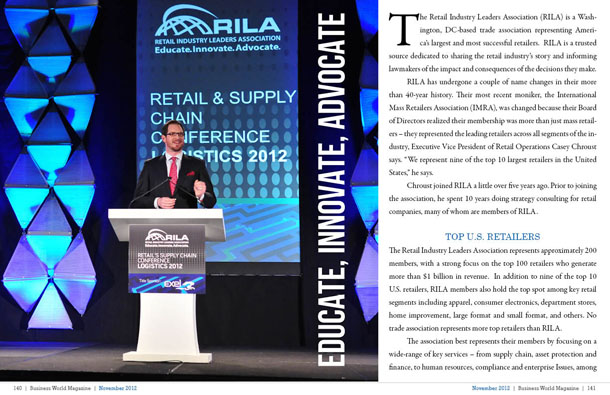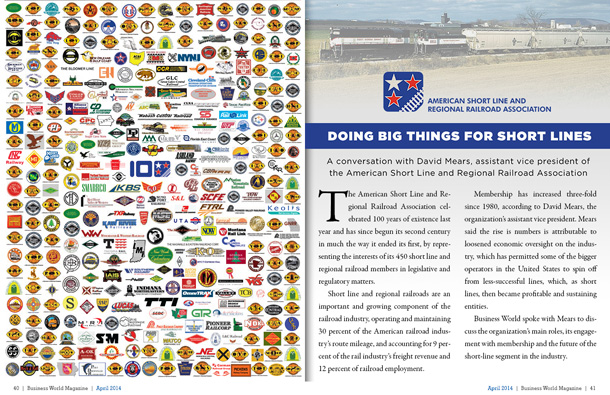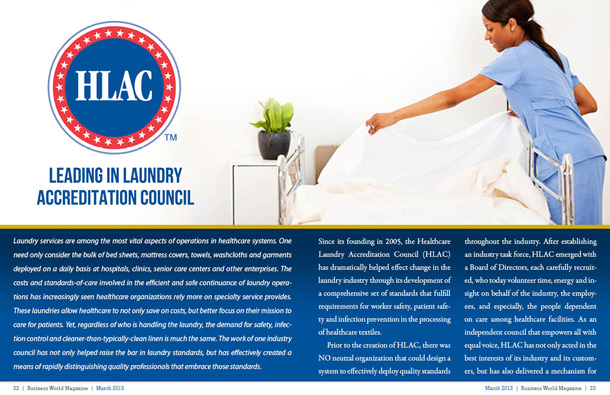
Educate, Innovate, Advocate

The Retail Industry Leaders Association (RILA) is a Washington, DC-based trade association representing America’s largest and most successful retailers. RILA is a trusted source dedicated to sharing the retail industry’s story and informing lawmakers of the impact and consequences of the decisions they make.
RILA has undergone a couple of name changes in their more than 40-year history. Their most recent moniker, the International Mass Retailers Association (IMRA), was changed because their Board of Directors realized their membership was more than just mass retailers – they represented the leading retailers across all segments of the industry, Executive Vice President of Retail Operations Casey Chroust says. “We represent nine of the top 10 largest retailers in the United States,†he says.
Chroust joined RILA a little over five years ago. Prior to joining the association, he spent 10 years doing strategy consulting for retail companies, many of whom are members of RILA.
Top U.S. retailers
The Retail Industry Leaders Association represents approximately 200 members, with a strong focus on the top 100 retailers who generate more than $1 billion in revenue. In addition to nine of the top 10 U.S. retailers, RILA members also hold the top spot among key retail segments including apparel, consumer electronics, department stores, home improvement, large format and small format, and others. No trade association represents more top retailers than RILA.
The association best represents their members by focusing on a wide-range of key services – from supply chain, asset protection and finance, to human resources, compliance and enterprise Issues, among others. “In these areas, we really focus on legislative, compliance and operational issues,†Chroust says.
On the retail operations side, RILA provides a forum where members can conduct discussions aimed at understanding common operational practices, areas of concern and pragmatic solutions to shared problems.
Shifting economy
The Retail Industry Leaders Association is always faced with the challenge of dealing with a tough economy. A consumer that struggles to pay the rent or utility bills is not going to have any disposable income to spend at retail outlets, after all. “These last three or four years have been a difficult time for the retail industry as a whole,†Chroust says. “As the unemployment rate climbed higher and higher, discretionary spending plummeted lower and lower.â€
While it’s been a tough time for retailers recently, there is a silver lining in the clouds. The industry had a positive holiday season in early 2011, with momentum carrying into spring and summer. “Retail sales have slowly yet steadily increased, much in line with the job situation,†he says. “The back-to-school selling season was very strong, helping propel retailers forward for this upcoming holiday season.â€
Policy Initiatives
The Retail Industry Leaders Association enjoys a positive and productive relationship with all levels of government.
A public policy issue they are currently leading on deals with interchange fees, or ‘swipe fees’ as they are commonly referred. This very contentious issue deals with fees merchants pay when customers use debit and credit cards at the point of sale. “We were trying to preserve economic freedom and consumer choice while fighting to rein in out-of-control fees and bring competition to the broken electronic payments market,†Chroust says.
Another one of RILA’s many focus areas is promoting e-fairness, which eliminates the tax advantage online retailers have over stores with physical presences. In-store retailers are required to collect sales taxes, while many online catalog retailers are not. “In our opinion, it is simply unfair that brick and mortar retailers, which create jobs in local communities, face a tax code that puts them at a significant disadvantage to their online competitors,†Chroust says. “Government just shouldn’t be picking winners and losers.â€
Consensus has formed around a solution to the challenge – federal legislation that gives states the authority to require most retailers to collect sales taxes while respecting individual states’ rights. “Making these changes levels the playing field for all retail merchants,†Chroust says.
Retail Trends
RILA works on environmental issues and business practices, since sustainability has been an emerging trend over the last several years in the retail industry. Retailers have discovered the triple benefit of pursuing sustainability initiatives. By operating in an environmentally-conscious way, retailers can reduce costs, improve their brand image, and help the environment.
“Our retailers are leaders in the sustainability space, continually working to be more environmentally friendly,†Chroust says. “One of the great outcomes from striving to be ‘green’ is that retailers have made their processes more efficient and reduced costs.â€
Another key trend in the industry is multichannel retailing. Today’s retailer has to sell across a myriad of channels – including in-store, catalog over-the-phone, online and more recently, mobile platforms such as smartphones and tablets. “We are trying to make a seamless customer experience for the shopper,†he says. “We want our brands to resonate with consumers in a consistent, meaningful way across these channels.â€
Channels are blurring, and the game is changing, though. With the ubiquity of smartphones, “It is the first time in the history of retailing where we can take one channel (mobile devices) into another channel (physical stores), and shop both of those channels at the same time,†he added.
The Future Landscape
Looking ahead to the longer term, RILA aims to continue to grow and acquire new members. Chroust says they will achieve that aim by doing the same thing they have been doing all along – staying focused on their mission to serve their retailers on legislative, regulatory and operational issues.
In five years, they envision all the leading retail brands to be part of RILA, advancing their interests within the federal and state legislature, while addressing common issues within operational areas. “We really are a service organization – we focus on our retail members’ needs first and foremost,†Chroust concludes. “We let them guide us to where they want us to make a difference.â€








